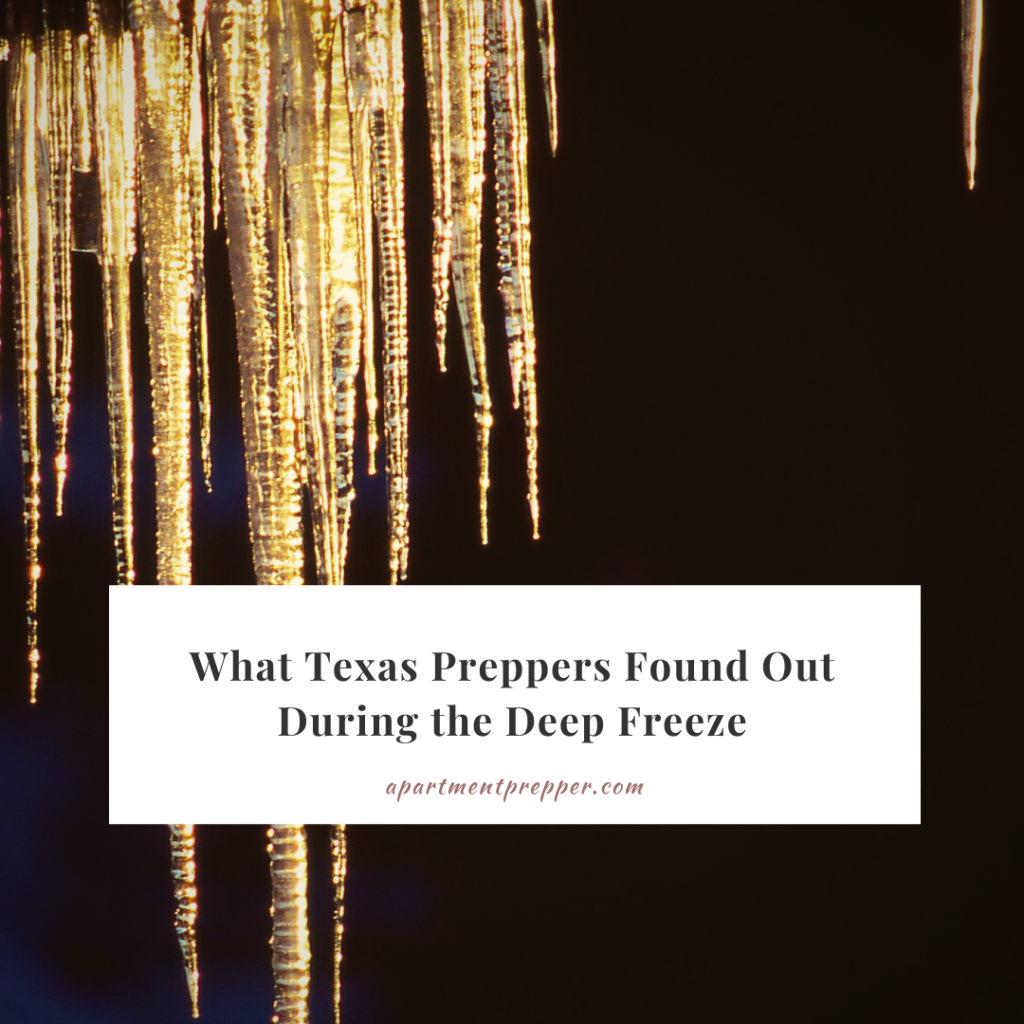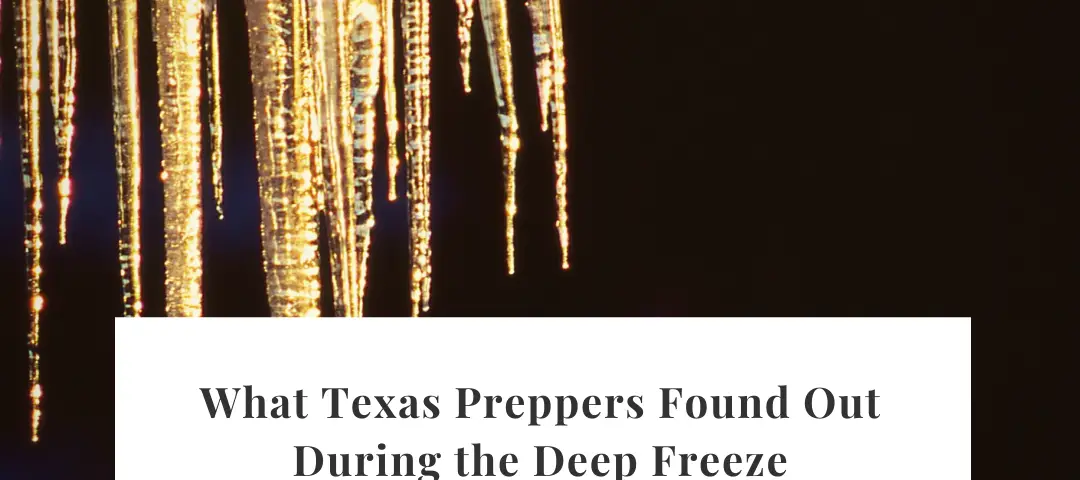Written by Bernie Carr
Now that things have somewhat settled down in Texas after the disaster, I reached out to readers to see how they fared during the severe winter storm that caused power and water crisis in Texas. I got some interesting responses.
The domino effect
Reader J.T. describes what happened to a lot of apartment dwellers in the Houston area after the winter storm hit:
Hundreds in apartments three weeks later still carrying water from ditches to flush toilets. Most people depended on our standard practice of opening sink cabinets and dripping water. First power went out. Apartments here are almost 100% electric heat. Then city water lines froze and burst. Then they thawed and pipes in apartments started leaking. We almost never lose water here and our buildings have uninsulated pipes in poorly insulated walls. City water had boil warning for a week but hard to boil without power.
Lessons learned:
Include a small water filter in your preps, LED headlamps, small inside safe propane heaters. Always have a minimum of three days worth of baby supplies, medicine, food and water.
Fill your bathtub
We had water at first, a real blessing. But we lost it for a day or so. As soon as we heard it would be a hard freeze we filled the tub (we only have one tub) with water and made sure it held water.
P.B.M.
Filling the bathtub full of water is something Texans have done to prepare for hurricanes. This common practice helped people cope with the water crisis after the severe winter storm.
Learn basic plumbing fixes
There were no plumbers available because everyone was in the same boat as we were. Luckily my hubby has some knowledge of how to repair simple plumbing issues. We had a key to shut off the water, but for some reason, there was still a little water coming out through the pipes. If we were unable to fix it ourselves, we would still be at the mercy of someone else and our house would still be wet. Knowledge, tools and parts!
K.F.
Know your plumbing pipe size and type. Some people used clamps and auto heater hose because no parts in 1000 miles.
J.T.
Lessons learned: Plumbing supplies and services will be scarce immediately after a disaster. Know how to shut off your water and learn some basic plumbing tasks. If own your home, stock up on a few plumbing pipes in case you have to replace damaged pipes in the aftermath of a disaster.
Fuel storage
Gasoline
… We have our own county water district, but the pumps went out at the well heads by the river. But the river is spring fed and ran to the river daily to get 5-gallon buckets of water. I have a 1600 gallon rain water collection tank, but that damn thing froze up as well as too it is above ground. Make SHTF filter for river water (sand and activated charcoal packs) to filter the river water and boiled it. So fetching water from the river with the pickup, and the river is 1/4 mile from my house and down hill…..
S.D
Propane
Although we had a way to cook we definitely need to up our fuel storage.
R.B.
Lesson learned: Include a few extra propane canister and store some gasoline (if you are able). Learn various water sources in your area. Also include a water filter in case you have to fetch water from a river or other sources.
Food storage additions
Easy to prepare foods
Our oven did not work because it was controlled electrically. It would ignite but it would not control the temp. As the freeze settled in, we moved the freezer foods to the patio. It was colder. We had a good supply of TP and basic foods including those that need little or no prep.
P.B.M.
Comfort foods
Didn’t have power outages here, but did have snow deep enough in the narrow alley the garage opens onto that I couldn’t get the car out for almost three weeks. I had everything I needed and didn’t run out, but I did get a few really overwhelming cravings for things I couldn’t get out to obtain. Not necessities, but the more I couldn’t get out, the more I craved them.
M.U.
Lessons learned: Your food storage should include foods that require little or no preparation, as you may not have power, or much water to cook with.
After a disaster you may not be able to leave your home for a few weeks. That’s when the cravings hit. Include some comfort foods in your food storage plan.
Know how to use your fireplace
A lot of fireplaces in Texas are unused, as it is warm for much of the year. When the severe winter storm came, many were unprepared to use their fireplaces.
Our gas fireplace is electrically operated so we made sure we knew how to operate it manually.
P.B.M.
if you have a gas fireplace. Practice using it. A lot of them require a battery remote to start. Lots of them were corroded or no batteries. Few people here even use them because it’s warm. But people set up tents to trap heat and camped next to tiny heat from gas logs.
J.T.
Lesson learned: It takes time to learn how things work and being under stress after a disaster is not the ideal time to do it. Learn how to use your tools and gadgets while things are “normal.”
Get a carbon monoxide alarm
Make sure you have carbon monoxide alarm. Over 50 people died in Texas from fires and carbon monoxide poisoning. J.T.
Lesson learned: Never use generators or gas barbecues indoors. Carbon monoxide can build up inside your house especially if you are unable to open the windows. A carbon monoxide detector is a simple device that can save your life. Install one in your home before the next disaster.
Back up power
I think one of the main weaknesses I saw was a generator. But I think I’d be a little afraid to use it in a neighborhood living. And Also more salt for melting snow and ice ( water softener salt). And we’ve already bought a tarp to help protect chickens better.
R.B.
I got oil lamps on a lark several months ago and ordered clean burning oil. They came in real handy in both light and a bit of heat. We were very prepared, thankfully, but a generator would have been really ice to have. We’re working on that now, and hope to be ready before hurricane season.
J.P.
…I thought I may run out of gas but didn’t for my genny. I had plenty of heat and food. Read several books by flashlight. I recharged them with a solar charger. I found nothing lacking in my preps but the quiet was hard to get used to…
T.A.
Lessons learned: Have a few layers of backup power sources. A solar charger can recharge small gadgets such as flashlights and cell phones. You may not be able to use a generator in an apartment, but there are other options.
Charge medical devices
Reader J.T. also added one crucial prep is to charge up any medical devices, as many people who relied oxygen and breathing machines had no electricity to power them.
The final word
Being prepared certainly helped during the power and water crisis in Texas. But there is always room to improve. We can all learn from these stories – my thanks from Apartment Prepper readers for sharing your experiences and your valuable advice.
What have you learned from this recent disaster? Please share in the comments!
About the author:
Bernie Carr is the founder of Apartment Prepper. She has written several books including the best-selling Prepper’s Pocket Guide, Jake and Miller’s Big Adventure, The Penny-Pinching Prepper and How to Prepare for Most Emergencies on a $50 a Month Budget. Her work appears in sites such as the Allstate Blog and Clark.com, as well as print magazines such as Backwoods Survival Guide and Prepper Survival Guide. She has been featured in national publications such as Fox Business and Popular Mechanics. Learn more about Bernie here.



Good article! Very interesting!
Thanks Ron! Glad you liked the article. Thanks for stopping by!
Having a campervan taught me mega loads of skills on how to live on very little water, power and etc. Even if you don’t have an RV, boondocking / dry docking skills are godsends when disasters of any type occur. YouTube and RV websites teach how to live on very little, extending your supplies and these skills will reduce stress and increase comfort. I use my camping skills, in my home, when it’s dangerous weather season and during high snow / cold vortex season.
Hey Michelle, Good for you! Learning to live on very little water and utilities is an excellent skill. I am sure this has helped you survive the recent disaster. Thanks for sharing!